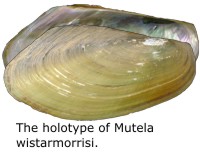| Page last updated
26 December 2007 |
Freshwater Mussels of Angola
These pages are based on the following article:
- Graf, D.L. & K.S. Cummings. 2006. Freshwater mussels (Mollusca: Bivalvia: Unionoida) of Angola, with description of a new species, Mutela wistarmorrisi. Proceedings of the Academy of Natural Sciences of Philadelphia 155: 163-194.

Abstract. The aquatic fauna of the Angola region in southwestern Africa, including the Cuanza (= Kwanza), Cunene, Okavango, upper Zambezi, Cassai (= Kasai) and lower Congo basins, is poorly known. The freshwater mussels (Mollusca: Unionoida) of the region have received little attention, and then usually as fringes to the Congo and Zambezi-Okavango systems. All available freshwater mussel specimens from thirteen major mollusk collections were examined and, along with a literature review, form the basis for this checklist. Twenty-three species in three families (Etheriidae, Iridinidae and Unionidae) are recognized from the Angola region, eight of which are newly recognized in the region or had not been treated as valid in recent revisions. One of these species, Mutela wistarmorrisi, is new to science and described herein. Chambardia welwitschi (Morelet), a widely recognized subspecies, is elevated to species-level status, and four more names are resurrected to valid status from synonymy: Mutela langi Pilsbry & Bequaert, Chambardia moutai (Dartevelle), Coelatura stagnorum (Dautzenberg) and C. rotula Pilsbry & Bequaert. Mutela legumen (Rochebrune) is recognized as the senior synonym for the species formerly referred to as Mutela carrei (Putzeys), and the known range of Aspatharia subreniformis (Sowerby) is expanded to include the Cunene, Okavango and Zambezi basins. Figures of each species are provided, and known distributions and persistent taxonomic issues are discussed. An appendix lists geocodes for localities associated with specimen records. |